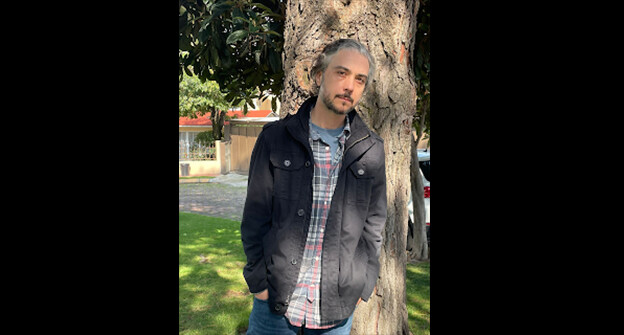Ricardo Cázares
New poems from 'So to Speak,' with translator’s note

Translated from Spanish by Joe Imwalle
(the rest
begins with brambles
bushes
mulberry trees sprouting
at the base of the cypress
and I suppose it was late
for tall grass it is late yes
tomorrow while you pass the fir trees
on the way to the station
tomorrow it rains
on a fruit stall in the market
(so I went to the end of the avenue
following the signs that in the end
did not say what you were looking for
yes says life
in theory in
attitude
intentions
will be
rewarded
be more daring in pursuit…
a cookie
a sign from the fortune
in the won-ton
it will make you feel young again and
loved, more
loved in the future
where chores and joys
were postponed
(not said in the past perfect tense
of someone living in Henan Province
丁戊奇荒
and that tomorrow
we walked to Sarlat
and it was good
it does us good
that path
piles of paper
cigarette butts
cups
boxes with memories
from another life
books
picture frames
blotches from chores
on the wooden deck
relics
reliquaries
the knob that winds a mechanism
to make time sing
“we die alone, lie alone
(nor be in bodies lost)”
toys
objects that may
one of these days
on their own
become useful to someone
though “There are no impervious skins or membranes in
nature, no ‘outlines’. Nothing is ever quite isolate.”
in the plaza
the municipal authority recently
ordered the planting
of a new path
of poplars
all afternoon
gusts of wet wind
you called at three
to see if I ate
if we finished
while watching the poplar saplings
bend
I told you a story
about my mother
they tell me
that verses on a wall
that were facing the Jordan
have been erased
on her father’s map
his house is a nameless
green smudge
there are specks of very fine dust
on the map from nineteen thirty-six
there’s a pair of tiny fragile legs
a trace of chitin
on the map
his house is a pistachio-colored blotch
where you can’t see the houses
his house is a field traversed
by a jagged line that ends
without touching the cobalt blue ink of the Atlantic
his house is a green smudge
dotted with yellow specks
on this spot a butterfly died
on this spot someone ate a cookie
on the map there are plains
on the map there’s no implication of grasslands
in his house every flower
every moth
is made of a saffron dust
in his house he remembers the summer
in which the wind splattered the green stain
of his father’s house
a nameless house
except one line that says Presas
then fades out without disrupting the sea
the map doesn’t mention
the name of his father
the map is a green stain
on the table lined with grooves
upon waking
the butterfly flutters over a river
and is confused by light from the window
TRANSLATOR’S NOTE. I first read Es un decir, Ricardo Cázares’s seventy-five-page serial poem, in the fall of 2019. Soon thereafter, time became a confusing thing to measure — and it was good to have a project with which to shelter in place.
The art of translation requires an eye for detail while maintaining a bird’s-eye view: I’d get caught up on a single word choice, then pull back and reread from the start for context. At the same time, translation requires acceptance that there’s always more out of reach. The speaker of these poems seems to be in a similar state of near and far — often in a liminal space on the verge of a greater understanding.
The book weaves together quotes of poets ranging from Arnaut Daniel, an Occitan troubadour of the twelfth century, to Basil Bunting, who in turn looks to thirteenth century Japan for the poet turned hermit, Komo no Chomei. Wallace Stevens is there, as well as Ezra Pound. Cázares is a translator too. He’s the first with a complete Spanish translation of Charles Olson’s The Maximus Poems, as well as Robert Creeley’s Pieces and several others. Olson and Creeley’s attention to ear and breath is present throughout as the lines shift across the page.
While the book first appeared in Mexico in 2013, I believe it’s just as timely now. The poems mirror a world that feels both intimate and international, too big and too small. These are open poems that reject tying the endings with a bow. The text slips easily from sound to sound and present to future to past and back again. The effect can be trance-inducing. I tried to carry this over into English.
I hope readers find enough in this excerpt to seek out more or return for multiple readings. The text welcomes meaning-making from those who engage. And those who do so may find that the poetic moment is at hand in their own lives, ringing across time in all directions.
[N.B. A posting of fragments from Cázares’s earlier book titled < > appeared previously on Poems and Poetics.]
Poems and poetics